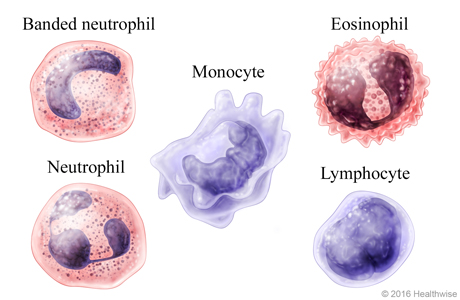Our Health Library information does not replace the advice of a doctor. Please be advised that this information is made available to assist our patients to learn more about their health. Our providers may not see and/or treat all topics found herein.
White blood cells

White blood cells protect the body against infection. Types of white blood cells include neutrophils, banded neutrophils, lymphocytes, monocytes, and eosinophils.
Each type of white blood cell plays a different role in protecting the body. The numbers of each type of white blood cells give important information about the immune system. Too many or too few of the different types of white blood cells can be a sign of an infection, an allergic or toxic reaction to medicines or chemicals, and many conditions, such as leukemia.
Current as of: May 1, 2025
Author: Ignite Healthwise, LLC Staff
Clinical Review Board
All Ignite Healthwise, LLC education is reviewed by a team that includes physicians, nurses, advanced practitioners, registered dieticians, and other healthcare professionals.
This information does not replace the advice of a doctor. Ignite Healthwise, LLC disclaims any warranty or liability for your use of this information. Your use of this information means that you agree to the Terms of Use and Privacy Policy. Learn how we develop our content.
To learn more about Ignite Healthwise, LLC, visit webmdignite.com.
© 2024-2026 Ignite Healthwise, LLC.


